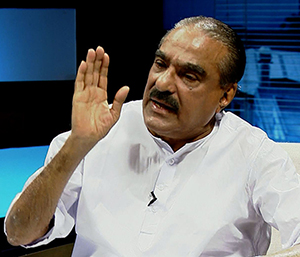Thiruvananthapuram, Aug 7: In a big jolt to the opposition Congress-led UDF in Kerala, a key partner--Kerala Congress (M) led by former Finance Minister K M Mani, severed its over three-decade old ties with the coalition, deciding to sit as a separate bloc in the state assembly.

A decision to this effect was taken at a crucial two-day conclave of the KC-M which concluded today at Charalkunnu in Pathanamthitta district.
Launching a tirade at the Congress, party supremo Mani said some leaders in the Congress had "consciously" made efforts to 'weaken' KC-M and especially its party leader who was "fiercely attacked and humiliated" by some in that party's leadership.
"Hence, the party has decided to sever ties with UDF and sit as a separate block in the assembly and function as a responsible opposition," the 82-year-old veteran said.
"We are leaving the UDF...." he said. In Parliament, KC(M) will provide issue-based support to Congress-led UPA, he said. However, Mani said in the local bodies, the tie-up with UDF would continue.
The UDF has "weakened" as political decency required in coalition politics has not been shown, Mani said. He hoped that the stand taken by KC(M) will help other coalition partners in UDF to introspect.
"Faith and love among the front partners has eroded and we are considered as an enemy. A battalion, a particular recruitment, a particular study class, was held to defeat us," he said, apparently pointing fingers at Opposition leader, Ramesh Chennithala, heading the 'I' faction in the Congress.
Asked to identify who he was referring to, Mani declined to give any names and said those in the Congress leadership would understand."Bar bribery case is only one of the reasons behind the decisions to leave UDF. There are other reasons also," he said.Asked about their future course of action, he said the party will neither go to LDF or BJP-NDA camp. "We will give all our attention to strengthening the party."
Reacting to the development, Congress leader and former Chief Minister Oommen Chandy termed the development as "unfortunate" while Chennithala, who was a target of KC-M, said Mani has "cheated" the democratic people of the state.
Describing KC-M as a 'beautiful lady', whom everyone wants to woo, talk to and join their camp, Mani said it will maintain its independent stand and not join any of the camps.
When asked why this decision was not taken earlier, Mani said "better late than never."
"We stayed on tolerating all the humiliations and pains heaped on us and we have reached the end of our patience," he said.On August 14, the KC (M)'s state committee meeting would be held at Kottayam, he said.Reacting to the development, Chandy said KC(M)'s decision was 'painful'.
Investigation in the bar bribery case led to some misconceptions that led to today's decision, he said, adding, two reports were filed by the investigating agencies, exonerating Mani.Rejecting KC(M)'s allegations that the Congress had tried to weaken it, KPCC President, V M Sudheeran said the party had in fact had only worked to strengthening it.
Referring to the 'equidistance' line adopted by Mani, he said it was only 'opportunism' and asserted that KC-M had been reduced to a party on which people have lost faith.
On the other hand, Chennithala said none would be allowed to threaten the Congress.
"If anyone feels that they can threaten us, and get things done, they will have to face the consequences. Do not be under the impression that the Congress era is over. The party will arise like a Phoenix from the ashes," he said.
Former LDF convenor Vakkom Vishwam said UDF has become an "inconsequential" coalition with today's development.KC-M, the third largest partner in UDF since 1982 after it came out of the then LDF ministry led by late E K Nayanar, has six MLAs in the present assembly.
The party has a strong base especially among Christians in the Central Travancore areas of the state. The party also has a lone MP, Jose K Mani, son of Mani.
Today's developments are the culmination of strained relations between the party and Congress over the bar bribery scam, that led to the resignation of Mani as Finance Minster from the previous UDF Ministry led by Chandy in November last.
KC-M nursed a grudge against Congress as many KC-M workers believed that the bar scam, in which an FIR has been registered, was a result of a conspiracy to 'tie-KC-M' in UDF. There were reports at that time that KC-M was planning to topple the UDF government and CPI-M had offered support to Mani, to become Chief Minister.Kerala Congress, formed in 1964, has a history of switching fronts and has suffered many splits since its inception.
The rift in relations between the Congress and KC(M) came to the fore after Mani announced he would keep away from a crucial UDF leaders liaison committee meeting last month, forcing the front to postpone it. Even though Congress leaders, including Chandy, tried to iron out differences by holding talks, Mani refused to budge.
Relations between the KC(M) and the Congress over the bar bribery scam worsened last month after Chandy and Chennithala attended the betrothal ceremony of the daughter of controversial hotelier Biju Ramesh with the son of Congress leader and former minister Adoor Prakash. Ramesh, working President of Kerala State Bar Hotel Owners Association, had levelled bribery charges against Mani, which finally led to his resignation.








Comments
Add new comment